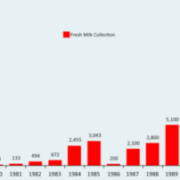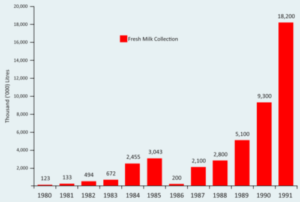Hunger looms as food suppliers abandon Elegu market over COVID-19 fears
Local leaders at Elegu border post, Elegu Town Council, in Amuru district, have expressed fears of a looming crisis as food suppliers at Elegu Market pull out due to the increasing COVID-19 cases being reported at the border.
According to the LC I Chairman of the area, Hassim Akule, many of suppliers of cassava, potatoes, rice, chicken, cows and goats for slaughter have already pulled out of the market leaving in the balance the lives of the 15,000 residents of the surrounding area.
“The increasing numbers of truck drivers testing positive for COVID-19 has caused us problems. Many people are afraid to bring produce to this area for fear of contracting the sickness,’’ he said.
Akule said that unless district officials come to their rescue, the residents of Elegu could face acute food shortage since majority of them are business people who depend on food purchases from other districts in the region.
One of the locals and a vendor at Elegu main market, George Kitoi, sells rice and beans. He said they no longer receive produce from both within and outside the district.
“We used to get rice from Pabbo and Atiak Sub Counties, and from Nwoya district, but as we talk now, there is no truck that crosses here. They have been told not to reach us here since we ‘have COVID-19’, which is not the case,’’ he said.
Kitoi decried rumours being spread abroad that all residents of Elegu town council are afflicted by COVID-19, rumours for which locals are paying dearly.
“The information out there is misleading; as far as we know, only truck drivers have so far tested positive for COVID-19, but in the community we are safe, and we should not be denied food,” he said.
Aisha Kakamega Olinga, formerly a regular food supplier at Elegu market, said that Elegu town council is considered a danger zone at the moment, which is why many traders dare not go there.
“We suspect that there is already a problem in the community, and that is why we cannot risk taking food supplies to the district that has been marked red,’’ she said.
Olinga further revealed that they had been warned by their communities that anyone who dares visit Elegu will be placed under quarantine for 14 days upon return.
Clash with MPs
MPs from the Acholi sub region under their umbrella, Acholi Parliamentary Group, (APG), last Friday asked government to close Elegu border point and place under quarantine all those in the area for 21 days in order to rule out community COVID-19 cases.
However their suggestion did not sit well with the locals, who accused them of selfishness.
For his part, Amuru district LCV Chairperson Michael Lakony tasked the MPs to engage the Ministry of Health to carry out at least 500 samples to ascertain whether there are any community COVID-19 cases at Elegu as they allege.
“We cannot deny members of the community services, based only on assumptions. The Ministry of Health should come to the ground and advise on what to do next,” he said.
Lakony warned that a total lockdown of the area would have serious implications for residents of Elegu.
“If the MPs want the locals to go under quarantine, they should prepare food for a population of at least 7,000 people in this area,’’ he said.
Elegu point of entry, at the border with South Sudan, has been cause for national concern after a spike in the number of positive COVID-19 cases recorded among truck drivers using this border point.
The post Hunger looms as food suppliers abandon Elegu market over COVID-19 fears appeared first on The Cooperator News.




